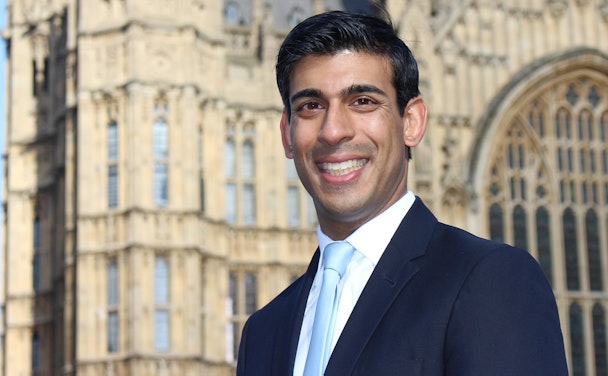Rishi Sunak as prime minister: what his policies mean for your marketing business
What brands and marketing businesses need to know about next PM’s economic policies and how he intends to reverse the chaos of Liz Truss’s 45-day reign.

Rishi Sunak / Ministry of Housing
After Boris Johnson excused himself from the leadership race leaving Penny Mordaunt as Rishi Sunak’s only rival, financial markets have reacted favorably. The pound jumped 0.4% against the US dollar in the early hours of Monday, October 24 to $1.13 and 0.6% against the euro to around €1.15.
Following confirmation Sunak had won the race, the FTSE 100 rose 0.6%, while the FTSE 250 index was up 1.3%.
Advertisement
Similarly, the interest rate on the 30-year gilt fell, suggesting confidence that a government led by Sunak wouldn’t default on debts.
All in, the markets are behind Sunak. They view the former chancellor as having sounder economic judgment than his predecessor, undoubtedly helped by his scathing and prescient prediction during the July leadership race that Liz Truss’s fiscal plan, dependent on unfunded tax cuts, was a “fairytale” that would send inflation spiraling and bring chaos to the markets.
“The markets are confident that they know the kind of prime minister Rishi Sunak is likely going to be because they know the kind of chancellor that he was and clearly he understood how damaging those unfunded tax cuts were likely to be,“ Danni Hewson, financial analyst at AJ Bell, told Reuters.
“The yields have come down, which just demonstrates that the markets feel that once again the UK is getting back to the kind of economy that they would expect from an established economy rather than an emerging economy.“
The critical question now is, with yet another cabinet reshuffle on the horizon, will he keep chancellor Jeremy Hunt in position and get behind his new and already market-steadying debt-cutting plan that is scheduled to be announced on October 31?
Advertisement
Charlotte Sallabank, partner at law firm Katten UK, said keeping him in place is almost a certainty if Sunak wants to keep stability in the markets. “As Jeremy Hunt’s mini budget effectively restored the fiscal policy to that which Rishi Sunak had proposed in his last budget as chancellor in March 2022, Sunak is unlikely to make many changes to fiscal policy,” she added.
Sallabank suggested he may now set a date for the reduction of income tax basic rate. “In his March budget Sunak set it to reduce to 19% on 6 April 2024 and in his leadership battle with Liz Truss in August he promised a reduction of 1% in 2024 with it reducing to 16% by the end of the next parliament (around 2029, potentially).”
Aside from income tax reductions, a key issue Sunak and Hunt will have to agree on is how to support those struggling to pay energy bills, including businesses. During the previous leadership race, Sunak said he would temporarily scrap the 5% VAT on domestic energy bills and spend heavily to support those struggling the most with the cost of living hikes.
Suggested newsletters for you
Truss ended up launching the Energy Price Guarantee, which promised standing charges and unit rates for households would freeze until 2024 and for six months for businesses. Hunt, however, made a U-turn on that policy and has only committed to the price guarantee as a whole for six months and will instead launch a Treasury-led review to bring in more targeted support for households and businesses in April.
Meanwhile, the 1.25% rise in national insurance contributions for businesses and staff could also be a sticking point between the new PM and Hunt. Sunak pressed ahead with his plan for a national insurance rise in April, only to have Truss reverse it when she came to power. That reversal remains in place under Hunt.
Long-term, Sunak’s fiscal strategy would likely follow plans made when he was chancellor. In his March mini-budget, he said he would increase corporation tax from 19% to 25% in April 2023 and reiterated in July that would go ahead if he was elected. That plan was discarded by Truss’s short-lived first chancellor, Kwasi Kwarteng, who said the tax would stay at 19% and ultimately allow companies to keep more of their profits. Hunt subsequently U-turned on that decision when he took over as chancellor, effectively putting Sunak’s plan back on the table.
UK economist Ruth Gregory said Hunt and Sunak will need to set out a new set of achievable policies to fill an estimated £34bn hole in the public finances. ”We will know more as the dust settles and Sunak’s fiscal strategy is announced,” she said.
”Overall, the news that Rishi Sunak will be the next PM means that the big downside risks to the economy posed by a prolonged period of political instability and a significant fiscal tightening have receded. But with a fiscal tightening still on its way, the risk is that the recession will ultimately be deeper or longer than we currently expect.”
Those concerns about a recession were compounded by new data from PMI showing that UK business activity contracted for the third consecutive month, falling to its lowest level since January 2021.
The British Chambers of Commerce director general Shevaun Haviland has called on an end to the "flip-flopping" of economic policies.
“The political and economic uncertainty of the past few months has been hugely damaging to British business confidence and must now come to an end. The new prime minister must be a steady hand on the tiller to see the economy through the challenging conditions ahead," Haviland said, adding Sunak needs to now show the sector “fully costed plans” that address issues like labour shortages and surging energy bills.
“We cannot afford to see any more flip-flopping on policies - the UK’s businesses need a sustainable, long-term economic plan they can believe in.”

